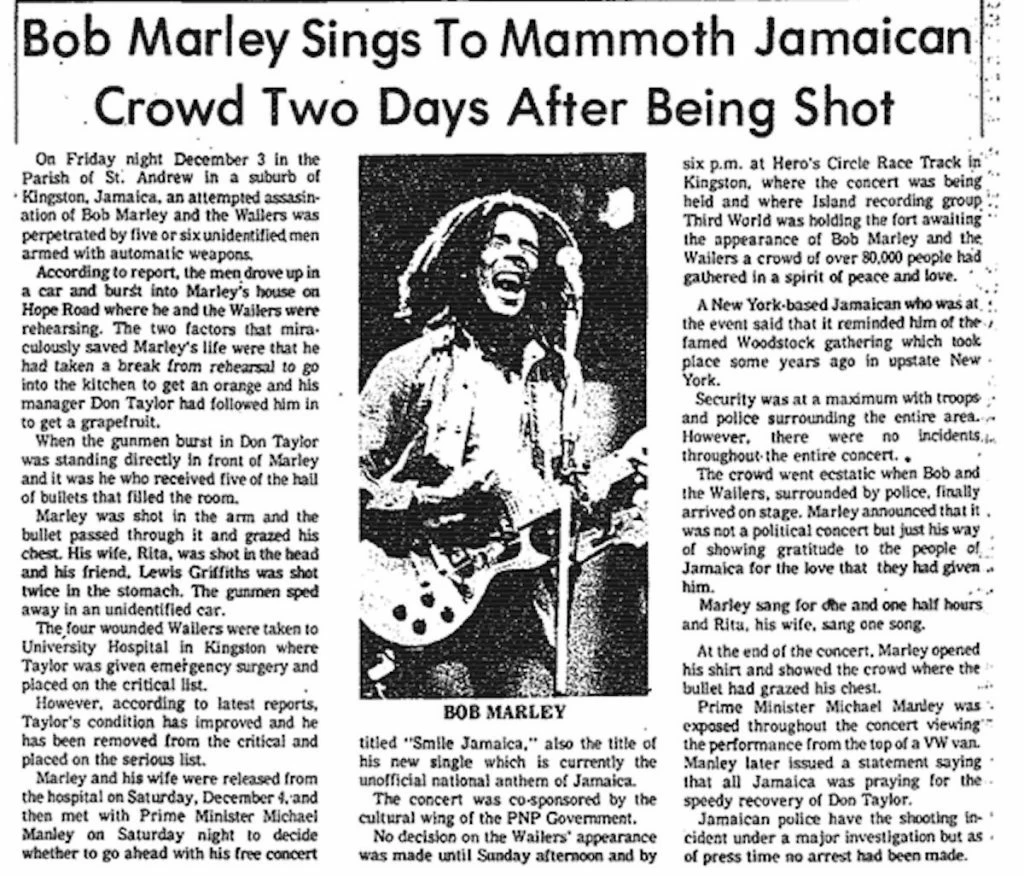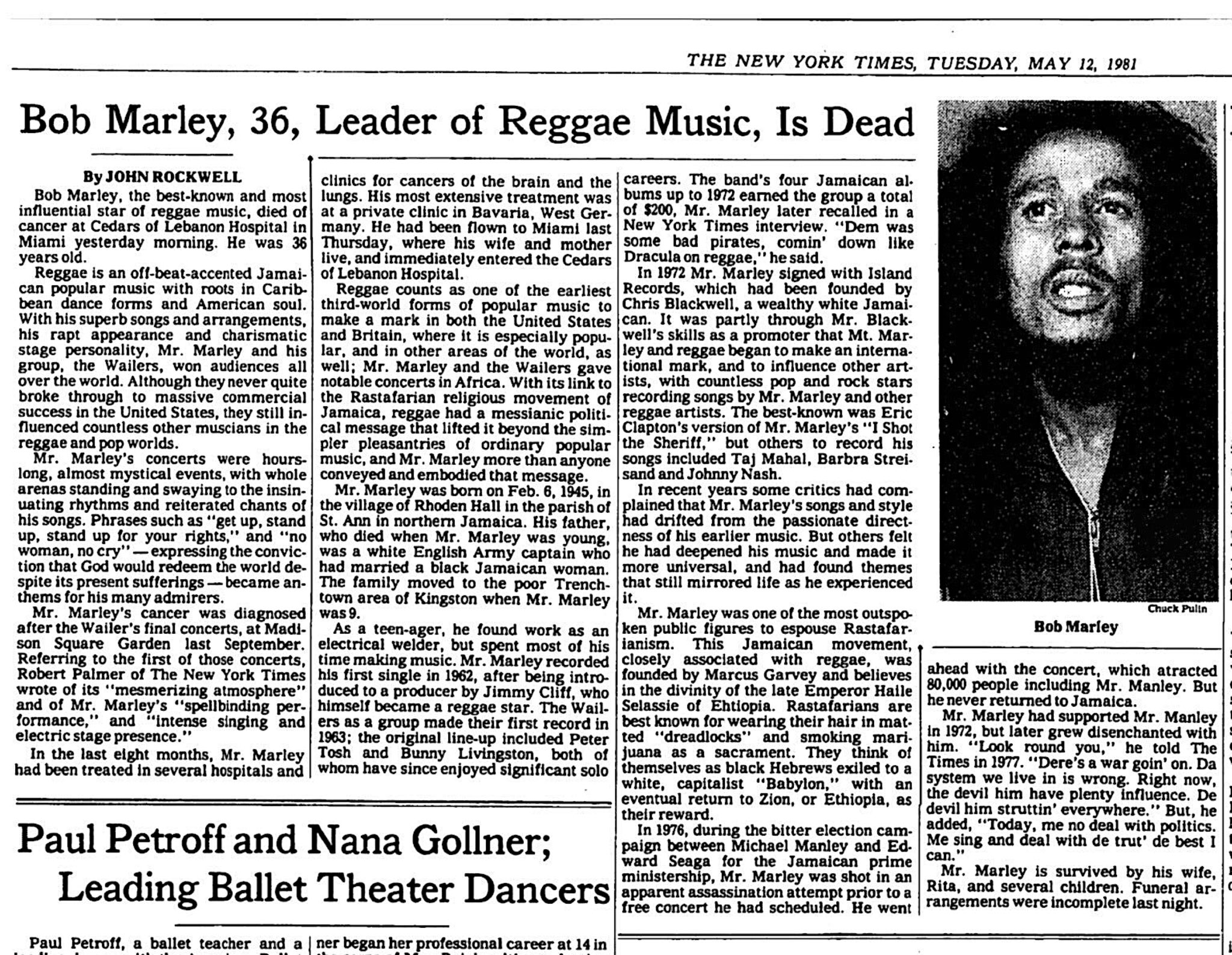Bob Marley Death Reason: The Untold Story Behind The Legend's Departure
When we talk about Bob Marley, it's impossible not to feel the vibrations of his music and the depth of his legacy. But behind the melodies lies a story that many fans might not know in its entirety. The reason behind Bob Marley's death is one of those untold stories that deserve a closer look. So, grab your favorite drink, settle in, and let’s dive into the truth about the man who changed reggae forever.
Bob Marley wasn’t just a musician; he was a cultural icon. His impact on the world of music is undeniable, and his influence still resonates today. But like all legends, his life wasn’t without its challenges, and unfortunately, his journey came to an untimely end. What caused the departure of this legendary figure? Let’s explore.
As we delve into the details of Bob Marley's death reason, it’s important to remember that this isn’t just about facts and figures. It’s about understanding the man behind the music, the struggles he faced, and the legacy he left behind. So, let’s take a moment to honor him by learning the truth.
Biography: A Walk Through Bob Marley's Life
Before we get into the specifics of Bob Marley's death, it’s crucial to understand the man himself. Here’s a quick look at his life through a biographical lens.
Early Life and Rise to Fame
Bob Marley was born on February 6, 1945, in Nine Mile, Saint Ann Parish, Jamaica. His full name was Nesta Robert Marley. The early years of his life were marked by a blend of cultures and influences, as his father was a white Jamaican plantation overseer and his mother was a black Jamaican villager. This duality played a significant role in shaping his worldview and music.
By the late 1960s, Marley had already begun making waves in the music scene. His collaboration with Peter Tosh and Bunny Wailer formed The Wailers, a group that would go on to define reggae music. Their sound was raw, emotional, and deeply rooted in the struggles of everyday Jamaicans.
Key Achievements
Bob Marley’s career was filled with milestones. Some of his most famous albums include:
- “Catch a Fire” (1973)
- “Burnin’” (1973)
- “Exodus” (1977)
These albums weren’t just hits; they were anthems for a generation. Songs like “No Woman, No Cry” and “One Love” became global sensations, transcending cultural barriers and bringing reggae to the mainstream.
Bob Marley Death Reason: The Medical Perspective
Now, let’s address the elephant in the room. What really happened? Bob Marley’s death reason is often misunderstood or oversimplified, but the truth is both tragic and profound.
The Diagnosis
In 1977, Bob Marley noticed a small wound on his toe that wouldn’t heal. Initially, it was thought to be a soccer injury, but further examination revealed something more serious: malignant melanoma. Melanoma is a form of skin cancer, and while it’s treatable if caught early, Marley’s condition had already progressed by the time it was diagnosed.
Doctors recommended amputation of his toe to prevent the cancer from spreading, but Marley refused. His decision was rooted in both personal and spiritual beliefs. As a devout Rastafarian, he saw his body as a sacred vessel, and amputation went against his principles.
The Spread of Cancer
Unfortunately, the cancer spread to other parts of his body, including his lungs and brain. Despite undergoing various treatments, including unconventional therapies, Marley’s health continued to decline. By 1981, it was clear that his time was limited.
Data and Statistics: Understanding Melanoma
To put Bob Marley’s situation into perspective, let’s look at some data. According to the American Cancer Society:
- Melanoma accounts for about 1% of all skin cancers but causes the majority of skin cancer deaths.
- Early detection is critical, as the survival rate for localized melanoma is around 99%.
While Marley’s case was unique due to his personal beliefs, it serves as a reminder of the importance of early detection and medical intervention.
Timeline of Events
Here’s a timeline of the key events leading up to Bob Marley’s passing:
- 1977: Diagnosis of malignant melanoma on his toe.
- 1980: Marley collapses during a concert in Pittsburgh, leading to further medical examinations.
- May 11, 1981: Bob Marley passes away at the age of 36 in Miami, Florida.
This timeline highlights the rapid progression of his illness and the challenges he faced in seeking treatment.
Legacy: The Impact of Bob Marley’s Death
Bob Marley’s death left a void in the music world, but his legacy continues to thrive. His music remains a source of inspiration for millions around the globe, and his message of peace, love, and unity resonates as strongly today as it did during his lifetime.
Cultural Influence
Marley’s influence extends beyond music. He became a symbol of resistance and hope, using his platform to address social and political issues. His commitment to Rastafarianism and his advocacy for African unity have inspired countless movements and leaders.
Lessons Learned from Bob Marley’s Journey
Bob Marley’s story is a powerful reminder of the importance of health, spirituality, and legacy. Here are some key takeaways:
- Early detection of diseases can make a significant difference in outcomes.
- Spiritual and personal beliefs can shape decisions, even in the face of medical advice.
- Legacy isn’t just about what you leave behind; it’s about how you live your life.
These lessons are as relevant today as they were during Marley’s time.
Personal Reflections on Bob Marley
For many fans, Bob Marley’s death was a shock. It was a reminder that even the most influential figures are human and vulnerable. But rather than dwell on the sadness, his story encourages us to celebrate life and embrace our passions.
How Fans Honor His Memory
Fans around the world honor Bob Marley in various ways:
- Attending annual concerts and festivals in his name.
- Listening to his music and sharing it with others.
- Supporting causes aligned with his values, such as equality and justice.
These actions keep his spirit alive and ensure that his message continues to inspire future generations.
Conclusion: Celebrating a Life Well-Lived
Bob Marley’s death reason is a tragic chapter in the story of a legendary musician, but it’s also a testament to his strength and conviction. Despite the challenges he faced, Marley remained true to himself and his beliefs, leaving behind a legacy that continues to inspire millions.
So, what can you do? Share this article with a friend, leave a comment, or dive deeper into Bob Marley’s music. Every action you take helps keep his memory alive. And remember, life is short, but the impact we make can last forever.
Table: Bob Marley’s Personal Data
| Full Name | Nesta Robert Marley |
|---|---|
| Birth Date | February 6, 1945 |
| Place of Birth | Nine Mile, Saint Ann Parish, Jamaica |
| Death Date | May 11, 1981 |
| Cause of Death | Malignant Melanoma |
References
For those who want to explore further, here are some trusted sources:
Table of Contents
- Biography: A Walk Through Bob Marley's Life
- Early Life and Rise to Fame
- Key Achievements
- Bob Marley Death Reason: The Medical Perspective
- The Diagnosis
- The Spread of Cancer
- Data and Statistics: Understanding Melanoma
- Timeline of Events
- Legacy: The Impact of Bob Marley’s Death
- Cultural Influence
- Lessons Learned from Bob Marley’s Journey
- Personal Reflections on Bob Marley
- How Fans Honor His Memory
- Conclusion: Celebrating a Life Well-Lived
- Vegamovies More Your Guide To Bollywood Streaming Watch Now
- Vegamovies 2025 Your Ultimate Guide To Free Streaming Alternatives

Bob Marley Death Cancer or Conspiracy? Historic Mysteries

Bob Marley Death Funeral

Bob Marley's Grandson's Cause of Death Finally Confirmed Parade